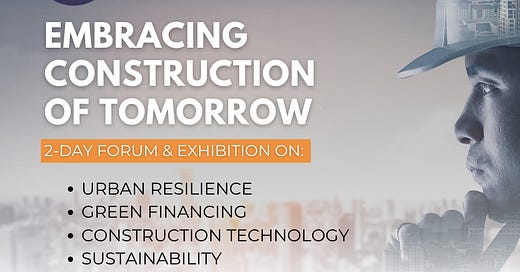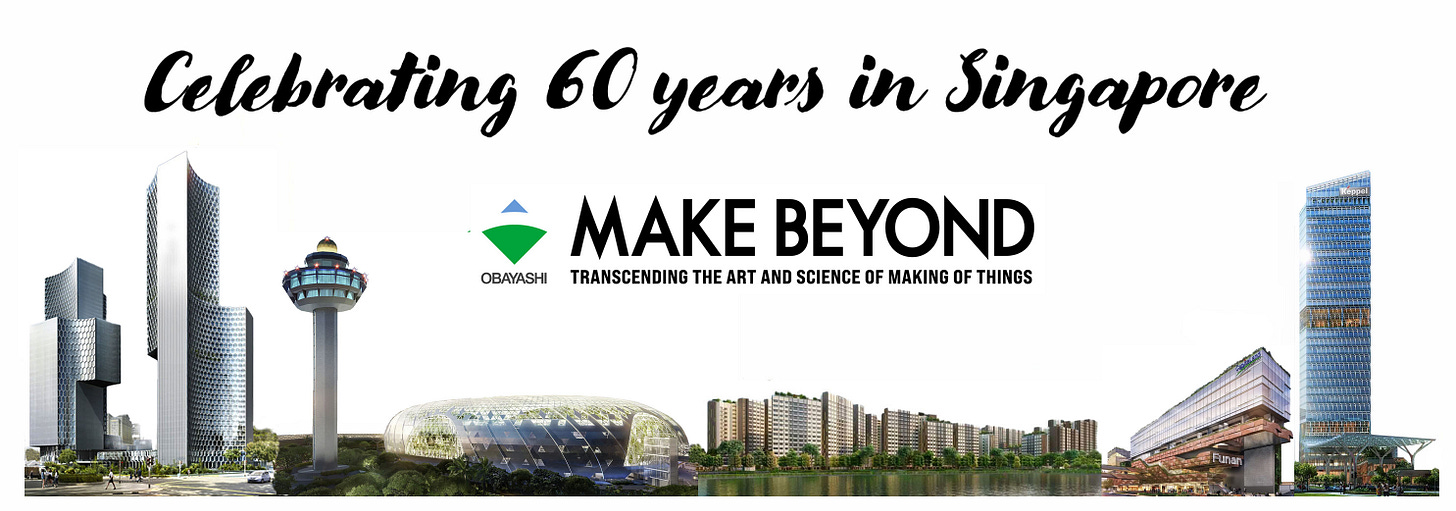Building Resilience: How the Construction Industry is Adapting to Climate and Sustainability Challenges
Key insights on sustainable construction from SC2 Pte Ltd's General Manager, Mr Loh Yeow Leng
"The greatest threat to our planet is the belief that someone else will save it."
— Robert Swan, Environmentalist & Explorer
As climate risks escalate and regulations tighten, the construction industry must evolve rapidly to align with green procurement policies, carbon reduction targets, and ESG (Environmental, Social, and Governance) standards.
For many contractors, this shift presents both a challenge and an opportunity. While sustainability requirements may appear to add costs and complexity, those who take proactive steps now will not only future-proof their businesses but also gain a competitive edge in securing new projects.
“I understand why many in the industry see sustainability as a policy challenge, but I encourage them to look at it as a business opportunity,” says Mr. Loh Yeow Leng, General Manager of SCAL’s subsidiary SC2 Pte Ltd. “Beyond benefiting the environment, sustainable practices can reduce business costs, enhance productivity, and even provide access to green financing and tender advantages.”
As SCAL continues to support contractors on this journey, we examine the key areas shaping the industry’s future - from climate resilience to digital solutions that drive sustainability.
Join us at IFAWPCA April, 7 – 11, 2025 at Sands Expo and Convention Centre, Singapore to learn more about sustainable construction:
Climate Resilience: A Growing Priority
Singapore’s construction sector is at the forefront of tackling climate-related risks. Rising sea levels and extreme weather events demand smarter urban planning, with an increasing focus on urban resilience and coastal protection projects.
Contractors must prepare for a surge in green infrastructure initiatives, including Super Low Energy Buildings (SLEBs), higher-tier Green Mark-certified projects, and retrofitting older buildings to lower carbon emissions. The shift is about building cities that can withstand climate stresses while minimising environmental impact.
“We are already seeing more projects incorporating low-carbon concrete and sustainable steel,” Loh explains. “As materials become more cost-effective, this trend will accelerate, making sustainable construction the new industry standard.”
For firms looking to stay ahead, investing in knowledge and technology is crucial. Those who integrate climate resilience into their business strategies will find themselves in a stronger position to win tenders and meet evolving regulatory requirements.
Green Procurement: A Competitive Advantage
With public and private projects increasingly requiring sustainability credentials, contractors will need to be ready to demonstrate their ESG commitments.
“The first step is for business leaders to educate themselves,” Loh advises. “Attending industry briefings, setting up sustainability departments, and embedding green practices into operations will give companies a head start.”
A structured approach includes:
Appointing a Sustainability Lead to drive internal initiatives.
Tracking and setting carbon emissions baselines for future reductions.
Adopting green practices in offices, project sites, and supply chains.
Exploring sustainability-linked financing, such as green loans.
While the shift may seem daunting, early adopters will benefit from greater access to funding, cost savings from waste reduction, and preferential treatment in tender evaluations.
Sustainability & Profitability: Dispelling the Cost Myth
A common concern among contractors is that sustainability comes with higher costs. However, while there are upfront investments, the long-term financial and operational benefits far outweigh them.
Reducing waste leads to direct cost savings.
Minimizing resource consumption increases efficiency.
Green building materials are becoming more affordable.
Sustainability-linked financing lowers borrowing costs.
“Businesses can only profit and prosper if we have a thriving, healthy planet to work in,” Loh points out. “Companies should look beyond short-term expenses and focus on long-term gains.”
Incentives and grants are also available to offset sustainability-related costs, and SCAL is actively working to help members tap into these opportunities.
Technology as a Sustainability Enabler
Technology is rapidly transforming sustainability efforts in construction, driving greater efficiency, reducing environmental impact, and enabling smarter resource management. Some of the key applications include:
AI and IoT solutions are improving efficiency and resource management.
Digital carbon tracking platforms simplify emissions reporting.
BIM and smart construction tools optimize materials usage and reduce waste.
“Technologies such as AI-assisted analysis and digital carbon accounting platforms can simplify compliance and enhance decision-making,” Loh explains. “Firms that leverage these tools will find sustainability easier to implement.”
Investing in the right digital solutions can help contractors balance environmental responsibility with operational excellence, ensuring long-term sustainability and profitability.
SCAL’s Commitment to Supporting Contractors
To help firms navigate these changes, SCAL is rolling out a series of training programmes, advisory services, and certification pathways in 2025.
Upcoming initiatives include:
📌 ESG workshops and seminars to educate members on sustainability requirements.
📌 Carbon assessments and strategic planning for decarbonisation.
📌 Green financing collaborations with banks to help members access funds.
📌 Certifications and assurance frameworks to support compliance efforts.
“SCAL is actively working with industry partners to provide contractors with the training and resources they need to succeed in the sustainability transition.” – Mr. Loh Yeow Leng, SCAL SC2
By taking advantage of these initiatives, contractors can future-proof their businesses and stay ahead of regulatory shifts while driving meaningful environmental impact.
Where Do Contractors Begin?
For firms unsure where to start, Loh offers a simple piece of advice: just take the first step.
✅ Attend sustainability-related training and seminars (many are free or subsidised).
✅ Start measuring carbon emissions to establish a baseline.
✅ Implement small green initiatives within your operations.
✅ Stay engaged with SCAL’s ESG Committee and industry events.
✅ Consider SC2’s ISO audit services to align with environmental management standards and enhance sustainability efforts.
“Sustainability is a journey, and it starts with awareness and small changes,” Loh says. “The sooner contractors begin, the better positioned they will be in this evolving landscape.”
By embracing sustainability today, Singapore’s construction sector can stay competitive, reduce costs, and contribute to a greener future.
Final Thought: The Time for Action is Now - Join us at ‘Embracing Construction of Tomorrow’ on 9-10 April
As regulatory expectations rise, contractors must act now to integrate sustainable practices into their business models.
With sustainability and climate resilience shaping the future of construction, contractors must adapt to new regulations, technologies, and expectations.
IFAWPCA 2025, themed “Embracing Construction of Tomorrow,” offers a unique opportunity to connect with industry experts and explore innovations shaping sustainability in construction. Hear from speakers at NUS, Surbana Jurong, Woh Hup, JTC Corporation, and Changi Airport Group on how contractors can prepare for the future and drive sustainable change.
📅 Join us at ‘Embracing Construction of Tomorrow’ on April, 7 – 11, 2025 at Sands Expo and Convention Centre, Singapore.







